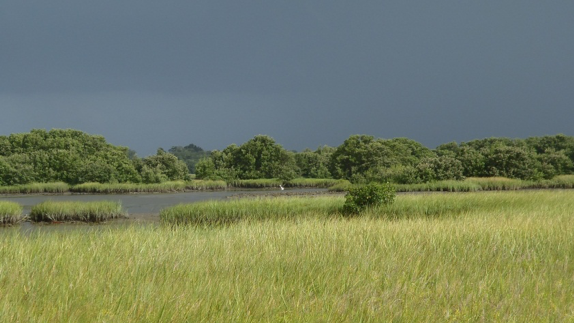Research Spotlight: Winter Climate Change and Coastal Wetlands: Mangroves vs. Salt Marshes


Coastal wetlands in the southeastern United States provide many benefits to society. In addition to supporting fish and wildlife habitat, these productive and abundant ecosystems protect coastlines, improve water quality, sequester carbon, subsidize coastal fisheries, and provide recreational opportunities. Resource managers in the region are increasingly challenged to better anticipate and prepare for the impacts of future change on coastal wetlands.
Salt marshes and mangrove forests are common coastal wetland habitats that have different climatic tolerances. In warmer climates, mangrove trees outcompete salt marsh grasses. Salt marshes are dominant along colder coastlines where mangrove forests are damaged by freeze events. Winter climate change is expected to lead to northward expansion of mangrove forests at the expense of salt marsh. Mangroves and salt marsh are both highly valued by resource managers.
In this project, researchers evaluated the vulnerability of salt marsh to mangrove expansion. They identified ecological thresholds and developed models for predicting future mangrove expansion. Our results highlight areas in TX, LA, and parts of FL where relatively small changes in the intensity and frequency of extreme winter events could cause landscape-scale ecological change in the form of mangrove forest migration and salt marsh displacement. The ecological implications of these marsh-to-mangrove conversions include changes for associated fish and wildlife populations and for the supply of certain ecosystem goods and services.
A notable and particularly charismatic example can be found in central TX, where salt marshes provide winter habitat for a critically endangered whooping crane population. Since 1989, mangroves in this area have been expanding at the expense of salt marsh, which concerns managers because mangroves are expected to negatively affect the habitat needed by cranes. If mangroves continue to expand and replace salt marsh, the winter habitat for this critically endangered population could be compromised.
Project Leader: Michael Osland, USGS Wetland & Aquatic Research Center
Research Collaborators: University of Louisiana at Lafayette, University of Houston
Stakeholders: State and federal natural resource managers (TX, LA, MS, AL, and FL)
Get more information on the SE CSC project page and see where the project was implemented on our Story Map.
- Categories: